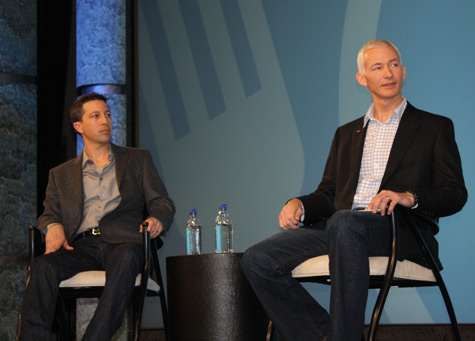

"Lessons Learned" panelists Alan Rosen (left) and Mark Goff
ONLINE EXCLUSIVE
JAN. 24 I SHOWS I ECONOMY
Handling Cautious Customers
NAMM hosted "Lessons Learned: How Doing Business Now Has Changed for the Better" the morning of Jan. 14, the second day of the show. The panel discussion, moderated by consultant Danny Rocks, looked at how four strong music retailers have managed the downturn and changing business climate. In particular, the panelists offered ideas for creating relationships with and selling to tough customers. Highlights:
George Hines
George's Music
Berwyn, Pa.
With the economy changed, customers are dealing with a lack of confidence. It affects [how they] go into stores. We looked at it from the standpoint of reaching out instead of waiting for them to come in, and we made the decision to do events and clinics at a heightened level. It allowed us to refocus our company and our business more on our customers and giving them a reason to come into the store. We were able to reverse that trend in about three or four months.
Gayle Beacock
Beacock Music
Vancouver, Wash.
The credit issue, I think, has affected us all. For our particular store, we depend a lot on step-up instruments from our rentals. So our biggest issue when all this happened with the credit industry was converting those rental customers to step-up instruments. We needed to figured out a way to get that instrument in their hands — not in an old way. [Customers] weren't just popping out a Visa like the old days. So our job as salespeople and retailers, good retailers, was to figure out the options that they had. Was there a way to get a monthly payment? Was there a way to get credit and have Grandma co-sign?
Mark Goff
Paige's Music
Indianapolis
We started what we call our Bravo program. We provide a feedback card to every customer, with every transaction. And on that feedback card there are four options where they can rate their experience with us. One is "bravo," which means we did a really great job; the other is "good"; the other is "OK"; and the other is "boo." It's postage-paid, so the customer can simply check off the appropriate response.
When there is a "boo" and the customer gives his or her name and contact information, I [as the owner] call them directly. And they often say, "I really had no expectation that anybody would read this or pay attention to it." So when I call them, they're surprised. My goal at that point is to save the relationship. I don't get very many "boos," but in most cases, with maybe one or two exceptions, I've been able to save every relationship, so we can continue to do business going forward.
Alan Rosen
Bananas at Large
San Rafael, Calif.
How many people actually know what their Yelp page says? I think at this point we recognize about 40 different social sites where we're ranked, where there are comments about us. The truth is, it matters. We have to go find out what people are saying. You need to know what people are talking about and respond to it. Every single negative response gets somebody getting in touch with that customer and trying to turn it around. We've actually seen on our Yelp page quite a few people posting a rewrite and saying, "They contacted us. I've changed my rating. We love them." That is invaluable advertising. It's the mentality of winning customers over one at a time right now.
| 




